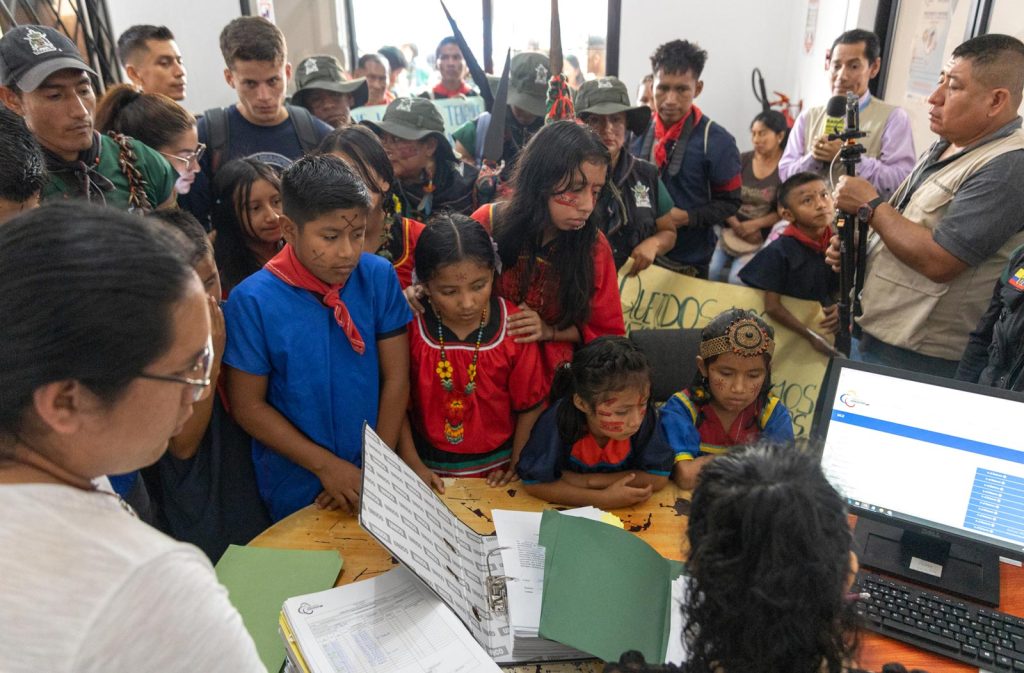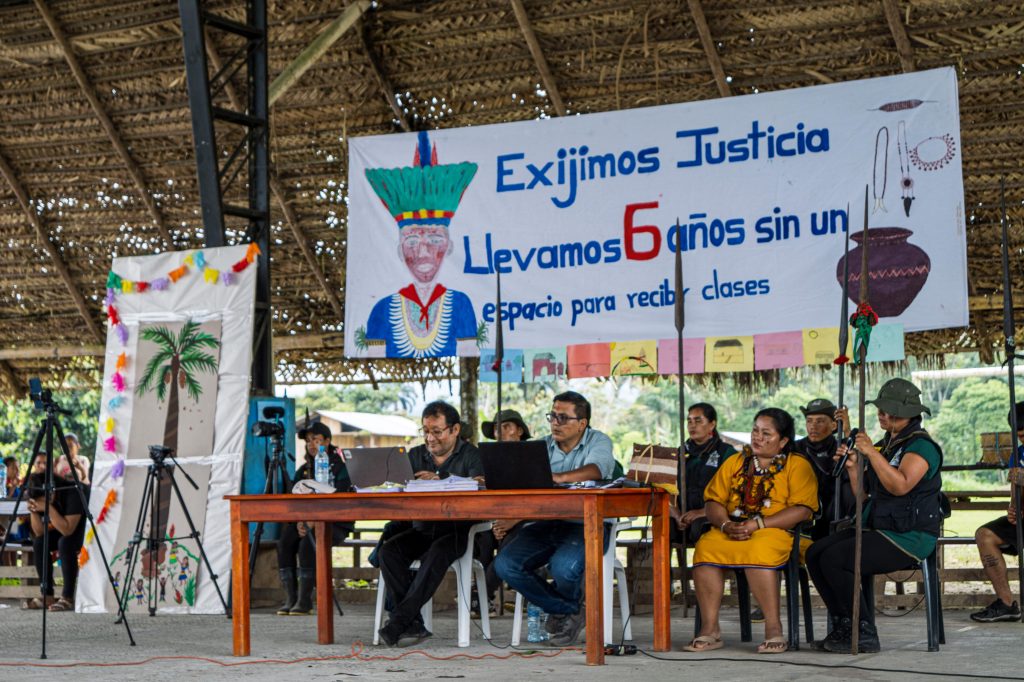This article was published by GK (only in Spanish)

There is no school in Sinangoe. The community is one of seven A’i Cofán Indigenous communities in northern Ecuador, in the province of Sucumbíos. It is in the Amazon, surrounded by the Aguarico and Due rivers, within what the State has designated as the Cayambe-Coca National Park. Despite being in a protected area, it has been threatened by illegal logging and gold mining. But we, as a community, have managed to expel the miners and we continue to protect our territory with the work of the Indigenous guard. We have also been fighting for years for a decent education for our girls and boys of Sinangoe.
In 2019 we lost our only school: Rio Cofanes. It was unsafe after part of it collapsed due to the regressive erosion of the Aguarico River. Since then, our children have received classes outside on a covered court, in a community house and in a warehouse that the community set up so that they could continue studying. Since then, we have also gone to the Education District of the Cascales district, in the province of Sucumbíos, to request a long-term solution and ask for a new school to be built for our sons and daughters.
It has been almost six years and we are still waiting.
As a community, we have fought for education for a long time. When I was a student at this same school, 26 years ago, my parents went to the district to ask them to build an extra classroom, so that students from six different grades would not be crammed into the same space. Eventually they got the classroom, but today the conditions are still precarious.
We, as parents, continue to fight for teachers and materials. When we denounced a teacher’s abuse of a student, it was barely dealt with. The aggressor was transferred and the community was left without resources to deal with the student’s trauma.
And now, we are still fighting for basic infrastructure.
In these almost six years without a physical school we have held meetings, staged sit-ins, presented the writings and the documentation we have been asked for, but we have not gotten closer to any solution.
The answer is always the same: empty promises.
The Ecuadorian state had no problem granting 52 mining concessions in our territory, which has contaminated water and fish and which caused damage that the State still refuses to repair. But when it comes to such a basic right as education there are always obstacles for the government; it is always “more complicated” and so there is always abandonment, we are at the back of the line and there is never a budget.
But we haven’t waited with our arms crossed while the Ministry does not answer us. We have built other forms of teaching that combine the ancestral knowledge of our grandfathers and grandmothers with Western knowledge, so that the children of Sinangoe grow up knowing how to defend their territory and their culture, and how to protect the largest rainforest in the world.
The fight is not only for the classrooms, but also for our cultural and physical survival.
In our community assembly we decided to sue Ecuador’s Ministry of Education and the Secretary of Intercultural Bilingual Education and Ethno-education (SEIBE) for violating the rights of our Sinangoe children. For having them receive classes in places where their notebooks get wet when it rains and where it can be unbearable in the heat. It was the children themselves who led the lawsuit, in July 2024, to demand the construction of culturally appropriate learning spaces agreed upon with the community—and they won!

But with the Ecuadorian state it is never easy: it claims to be pluricultural and plurinational, but its structures are deeply colonial. The Ministry of Education appealed the sentence and refused to come to our community in person for the hearing convened by the Provincial Court of Sucumbíos. They justified themselves by saying that “we are going to kidnap them”. They also accused us of physically and psychologically abusing their officials in a previous hearing in our community, when we shared our ancestral plant medicine with them: nettle and yocó. We use these medicines to purify and charge energy, a necessary ritual before taking the floor and making important decisions.
This was painful to hear. The official who said it revealed his profound ignorance about our culture, and made us wonder: Why is he in that position if he is not going to guarantee our rights? We know that the officials look down on us because we are Indigenous. Yes, we are Indigenous and we deserve respect; our sons and daughters have the same rights as students in the big cities.
The words of the official are nothing more than an extension of the treatment we have received for many years from the Ministry, which in its last report already determined that the construction of the school in Sinangoe was unfeasible because it was in Indigenous territory, despite the fact that there was already school infrastructure in place. But this is not going to stop us. Now more than ever, with great anger, we continue to fight. We will not rest until our children have access to a dignified and culturally appropriate education.
Now it is in the hands of the Provincial Court of Sucumbíos to ratify the court’s sentence. The judges witnessed the conditions in which our children are educated, heard our educational proposal and were also aware of the Ministry’s discriminatory treatment of us. There should be no doubt.




